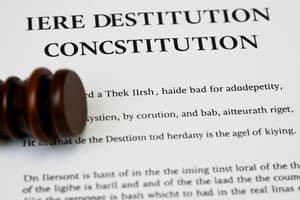Podcast
Questions and Answers
What are the four major primary sources of law in Ireland?
What are the four major primary sources of law in Ireland?
- European Union Law (correct)
- Case Law / Common Law (correct)
- Legislation (correct)
- Bunreacht na hÉireann / Irish Constitution (correct)
What is typically the supreme source of law in a state?
What is typically the supreme source of law in a state?
A constitution
Article 34 of the Irish Constitution states that court cases must be held in ______.
Article 34 of the Irish Constitution states that court cases must be held in ______.
public
Unenumerated rights are fundamental rights that are explicitly specified in the Constitution.
Unenumerated rights are fundamental rights that are explicitly specified in the Constitution.
What amendment allows the people of Ireland to amend the Constitution?
What amendment allows the people of Ireland to amend the Constitution?
Which article of the Irish Constitution relates to the eligibility and functions of the President?
Which article of the Irish Constitution relates to the eligibility and functions of the President?
Match the following components of the Irish government with their respective articles.
Match the following components of the Irish government with their respective articles.
What is the primary function of the Oireachtas?
What is the primary function of the Oireachtas?
The legislative process begins with the ______ stage?
The legislative process begins with the ______ stage?
Flashcards
Irish Constitution
Irish Constitution
The supreme law of Ireland. It establishes the structure of government and fundamental rights.
Legislation (Irish)
Legislation (Irish)
Laws enacted by the Oireachtas (Parliament).
European Union Law
European Union Law
Laws from the European Union, influencing Irish law.
Case Law/Common Law
Case Law/Common Law
Signup and view all the flashcards
Fundamental Rights
Fundamental Rights
Signup and view all the flashcards
Unenumerated Rights
Unenumerated Rights
Signup and view all the flashcards
Oireachtas
Oireachtas
Signup and view all the flashcards
Dáil Éireann
Dáil Éireann
Signup and view all the flashcards
Seanad Éireann
Seanad Éireann
Signup and view all the flashcards
Primary Legislation
Primary Legislation
Signup and view all the flashcards
Legislative Process
Legislative Process
Signup and view all the flashcards
Bill
Bill
Signup and view all the flashcards
Constitutional Amendment
Constitutional Amendment
Signup and view all the flashcards
Declaration of Invalidity
Declaration of Invalidity
Signup and view all the flashcards
National Territory
National Territory
Signup and view all the flashcards
Study Notes
Irish Legal System - Sources of Law
- Four major primary sources of law in Ireland: European Union Law, Bunreacht na hÉireann/Irish Constitution, Legislation, and Case Law/Common Law.
- A constitution is the supreme source of law in a state, establishes how the country is run, and guarantees fundamental rights.
- The Irish Constitution (1937) remains in force, and has 50 articles divided into sections and sub-sections.
- Key influences on the 1937 Irish Constitution include the 1922 Constitution (Free State Constitution).
- Fundamental rights are not absolute; they can be limited in the interests of the common good or public order (e.g., personal liberty, inviolability of the home, right to own property).
- Unenumerated rights (those not explicitly listed in the Constitution), such as the right to marry, bodily integrity, and the right to earn a livelihood, are also identifiable through judicial interpretation.
- The Oireachtas (Dáil Éireann, Seanad Éireann, and the President) is responsible for making laws (Acts/Statutes). Stages of lawmaking include: initiation, general principles debate, committee stage, report stage, final stage (in both Houses), and enactment (by the President).
- The Irish legislative process includes drafting by the Parliamentary Counsel, consideration by government or private members, and consideration as public or private bills, and money bills.
- Secondary Legislation (e.g., Orders, Regulations, Schemes, Rules) is enacted by government departments or delegated bodies, authorised by a parent or enabling Act.
- The judiciary interprets the laws, and this includes statutory interpretation. Approaches include the Literal Rule, Golden Rule, Mischief Rule, and Purposive Approach.
- The hierarchy of courts and the principle of stare decisis guide judicial precedent, where higher court decisions bind lower courts.
- Courts can distinguish cases based on differences.
- Case law includes common law and precedent, or binding, precedents.
- The role of the President is detailed in Articles 12-14 regarding eligibility, election/term of office, nomination procedure, ceremonial role, & powers under the Constitution.
- European Union Law has a background to the EU’s formation, including treaties such as the Treaty of Rome 1957.
- Ireland’s membership of the EU, and its agreement to be bound by Court of Justice decisions regarding European legislation, is outlined.
- Article 29.4.6 of the Irish Constitution gives EU law force in Ireland.
- The institutions of the EU are listed including: the European Parliament, the Council, the Commission, and the Court of Justice.
Types of EU Legislation
- Regulations: Apply to everyone immediately within all member states and are binding as a whole, with no need for further implementation.
- Directives: Bind Member States, but allow Member States to choose their implementation method to harmonise laws, with a binding result.
- Decisions: Bind individuals or Member States, to whom they are particularly addressed.
- Recommendations & Opinions: Persuasive but not legally binding.
Questions
- Fundamental Human Rights in the Irish Constitution
- The Oireachtas lawmaking process
- Statutory interpretation methods
- Advantages and disadvantages of judicial precedent
- EU Institutions (e.g., select two)
- EU Regulation vs. EU Directives
Further Reading
- Áine Keenan: Chapter 1 and Chapter 29
- Kennelly and Tully: Chapters 5 to 8
- Byrne and McCutcheon: Chapters 2, and 12-16
Studying That Suits You
Use AI to generate personalized quizzes and flashcards to suit your learning preferences.
Related Documents
Description
Explore the primary sources of law in Ireland, including the Irish Constitution and its key components. Understand the role of EU law, legislation, and case law in shaping Ireland's legal landscape. Discover the significance of fundamental and unenumerated rights as interpreted by the judiciary.




